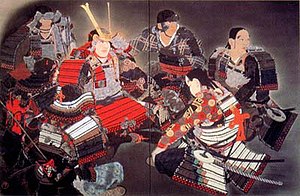Seison Maeda
| Maeda Seison | |
|---|---|

Maeda Seison in 1955
|
|
| Born |
Maeda Renzō January 27, 1885 Nakatsugawa, Gifu, Japan |
| Died | October 29, 1977 (aged 92) Kamakura, Kanagawa, Japan |
| Nationality | Japanese |
| Known for | Painter |
| Notable work | Dokutsu no Yoritomo |
| Movement | Nihonga |
| Awards | Order of Culture |
| Yoritomo in a Cave (洞窟の頼朝 Dokutsu no Yoritomo?) | |
|---|---|
 |
|
| Artist | Maeda Seison |
| Year | 1929 |
| Type | Nihonga |
| Dimensions | 190.5 cm × 269.9 cm (75.0 in × 106.3 in) |
| Location | Okura Shukokan, Tokyo |
Seison Maeda (前田 青邨 Maeda Seison?, January 27, 1885 – October 29, 1977) was the pseudonym of a nihonga painter in Taishō and Shōwa period Japan. His real name was Maeda Renzō. He is considered one of the greatest contemporary Japanese painters, and one of the leaders of the Nihonga movement.
Maeda was born in what is now Nakatsugawa city, Gifu Prefecture in 1885. His mother died when he was 13, and he moved to Hongō in Tokyo with his father. In 1901, through the introduction of Ozaki Kōyō, Maeda enrolled at the art school headed by Kajita Hanko, from whom he received the name "Seison" in 1902. He met and befriended fellow student, Kobayashi Kokei, whose work influenced many of Maeda's early paintings.
Maeda was a member of the Kojikai artistic group from 1907, and of the Japan Fine Arts Academy (Teikoku Bijitsuin) from 1914. He visited Korea in 1915 and China in 1919. Under sponsorship of the Japan Fine Arts Academy, he visited Europe in 1922, touring Rome, Florence, Paris and London for almost one year. Although he was greatly impressed by the frescoes of the Italian Renaissance master Giotto at Assisi, Maeda remained faithful to the traditional Yamato-e and Rimpa styles of Japanese painting, and came to be known for his watercolor paintings on historical themes, primarily portraiture. However, Maeda worked in a variety of genres, including still life and landscapes.
...
Wikipedia
